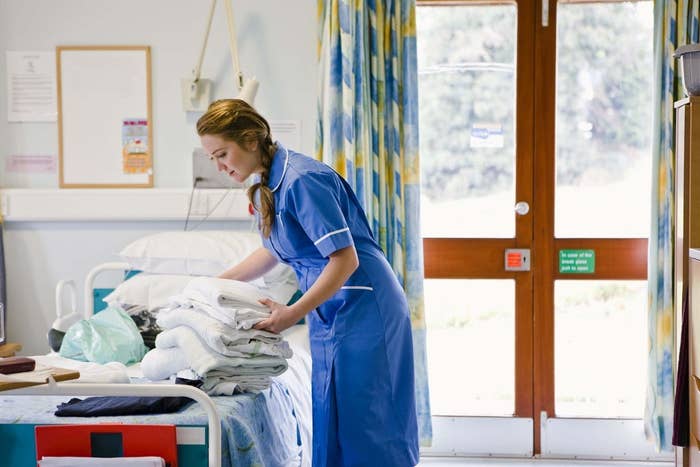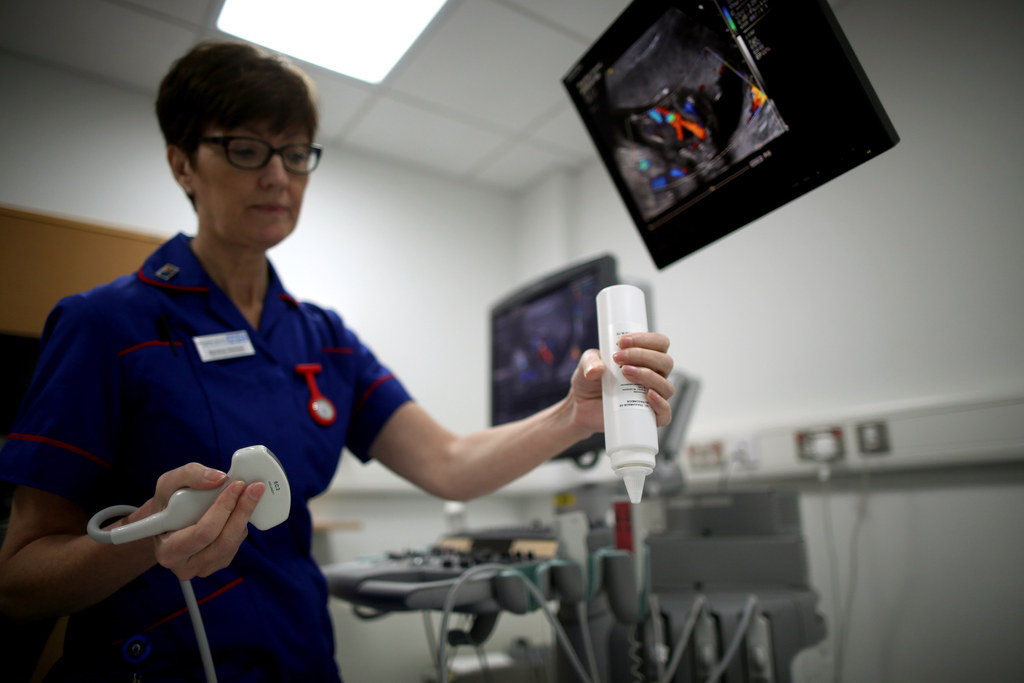In the government's last Spending Review, it was announced that bursaries for nurses and midwives would be replaced with student loans in an attempt to "modernise" funding for healthcare students.

Nursing midwifery, and allied health professional (AHP) students living away from their parents in England (outside of London) are currently entitled to an annual £1,000 non-means-tested grant and an annual means-tested NHS bursary payment of up to £4,491.
NHS student bursaries are paid on a monthly basis for the duration of a course. Some students are also eligible to receive dependants' and childcare allowances.
From 2017, this bursary, available to all nursing, midwifery, and AHP students, will be replaced with loans, meaning trainees will be able to access 25% more funding, according to the Department of Health.
The government said this will create up to 10,000 more training places, as well as bringing "nursing students into line with the arrangements for students undertaking other university degrees".
Health minster Ben Gummer said: "I am determined to expand nurse training places but we can only do that if it is affordable."
The medical community, however, is unhappy with the changes, and on Saturday there will be a march to Downing Street to protest the cancellation of the bursary.

We spoke to campaigners, student nurses, and nursing education institutions to find out why they feel it's important to protect the nurses' bursary:
1. Nurses feel like the removal of the bursary means they will be forced to "pay to work for the NHS".
Student nurses spend half of their three-year degree course on a practical placement, which means working the same full-time rota as a qualified nurse. Overall this equates to around 2,300 hours of work.
"I finished a six-week placement in A&E at the end of October where I worked night shifts and weekend night shifts," a second-year student nurse who preferred not to be named told BuzzFeed News. "And those were long, 11-and-a-half-hour days, seven days a week. I worked every single shift my mentors did."
Because it's a training placement, the work is unpaid, but under the current system the bursary helps cover a student nurse's living costs. The proposed system would see students taking out loans, meaning they would ultimately cover the costs themselves.
"What's so outrageous about the government's proposal is that student nurses will effectively be asked to take out loans to pay for the privilege of working in our hospitals and caring for patients whilst on practical placements," Peter Stefanovic, a medical negligence solicitor and NHS campaigner, said in a video message that has been viewed almost 15,000 times on Facebook.
"From our point of view, the government is asking future student nurses to pay to work for the NHS for 2,300 hours," a third-year student nurse, who also preferred not to be named, told us.

2. Working long hours both at university and on placements means student nurses could struggle to supplement their incomes with part-time work like many other students do.
While at university, many students take part-time jobs to supplement their student loans, but "student nurses are very, very different", Stefanovic pointed out. "Student nurses cannot be compared to ordinary students because they don't just study, they work."
A third-year student nurse told us that because the course involves balancing periods of a "9-to-5 working week" at university with 48-hour working weeks when on a placement, "We don't really have the time to undertake part-time work as other students might."
A spokesperson for the Royal College of Nursing echoed their point. "Half our time is spent doing clinical work and our academic year is longer, giving us fewer opportunities to earn money in our spare time," they said.
Members of the nursing community claim that not only would long hours make it difficult for a student nurse to find part-time work, the exhausting nature of a practical placement could make extra work especially difficult.
"We work really, really hard and it's tough when you're on the job," a second-year student nurse told us.
"It's physical, it's emotional, and you're also trying to learn. You're absolutely knackered all the time."
3. People are worried that future student nurses would struggle to pay back a large loan debt with a qualified nurse's low salary.
Health minister Ben Gummer has said "new loans will ensure that trainees will receive around 25% more funding support at university, an increase that will make a real difference to students".
While student nurses will receive more funding under the new system, this is all money they will be required to pay back.
"The government changes mean that students are going to have to get into more debt to study to be a nurse," one student nurse told us. "It doesn't really add up."
In 2014 it was estimated that students were leaving university with an average of £44,000 worth of debt.
Loans for student nurses are set to replace bursaries from 2017, so when the first students subject to the new system qualify in 2020, the union Unison believes they could do so £50,000 in debt.
A nurse's qualifying salary is £21,000 in the UK, and £25,200 in London. According to the Office for National Statistics, in 2015 the average annual salary for a full-time employee in the UK was £27,600.
Nursing is considered to have one of the lowest professional salaries. Research by the Royal College of Nursing claims nurses' pay, which has been frozen, has effectively fallen by 10% over the last decade in line with inflation.
"Taking away these grants and replacing them with hefty loans will only pile on more personal financial pressure to an already overstretched part of the healthcare workforce," a spokesperson for the Royal College of Nursing told us.
"Not only that but many may never be able to pay back the loans, which will not save any money in the long run and makes little financial sense."
While this will only affect future students, one current student nurse, who said being from a poor background meant she would never have been able to consider training if it wasn't for the bursary, still felt the impact of the changes.
"The day it was announced I had so many people who have children or are from a poor background like me saying there's no way they could follow their dreams now, because there's no way they could manage that debt coming out of their salary," she said.

4. Student nurses tend not to be school-leavers and therefore often balance the cost of education with other financial responsibilities.
The average age of a student nurse in the UK is 29, according to Nursing Times. "It's not just school-leavers, it's people from the age of 18 right up to the age of 50," one trainee told us of the mix of her fellow students.
"On my course lots of students had children, so the bursary was a huge help," a Birmingham-based nurse who qualified around five years ago told us.
While the Department of Health has said that the new system will allow new student nurses to access more money upfront and create 10,000 new training places, there is a fear that for the mature students making up the majority of trainees – who are more likely to have other financial responsibilities such as mortgages or children – committing to such a large amount of debt may not be a viable option.
5. It is believed changes could lead to further staff shortages, leaving nurses who are already qualified or training even more stretched and compromising patient safety.
More than 10,000 nursing vacancies remained unfilled in London in 2015, according to new findings by the Royal College of Nursing.
This amounted to 17% of the city's nursing jobs, up from the 14% that lay vacant in 2014, which was already up from 2013's 11%, according to the BBC.
Nationally, the figure for 2015 was 10%, and it is feared that the added financial pressure of a large loan will only deter future students further.
While the government's justification for the switch from bursaries to loans includes the fact that more money will therefore be available to fund more trainee places, a spokesperson for campaigners at King's College London, a leader in nursing education, argued that "removing the bursary will deter future students, exacerbating the current crisis in nursing recruitment and adding further strain to struggling NHS services".
The Royal College of Nursing agreed. "This decision risks severing the critical link between the NHS and nursing students and in doing so the government is effectively absolving itself of any responsibility to ensure that the right numbers of nurses are in the right place and with the right skills," its spokesperson said.
"To cut bursaries when we have a shortage of nurses in this country is quite frankly extraordinary," Stefanovic said.

6. As members of a profession based more on care than financial gain, nurses feel especially penalised by what they see as prohibitive cuts.
"I chose to come into this because I like helping people and I like the patients," one student nurse said. "We're trying to do something good for people.
"If something bad happens, or if a family gets some bad news, we're the ones that can take the time to sit with them.
"We're the ones who will be the shoulder to cry on.
"We support the patients if they've been in a terrible accident. When an elderly patient is scared we're there holding their hands.
"I'm sure that if George Osborne was in hospital, he'd much rather have a nurse who wanted to care for him rather than simply one who could afford to do it."
